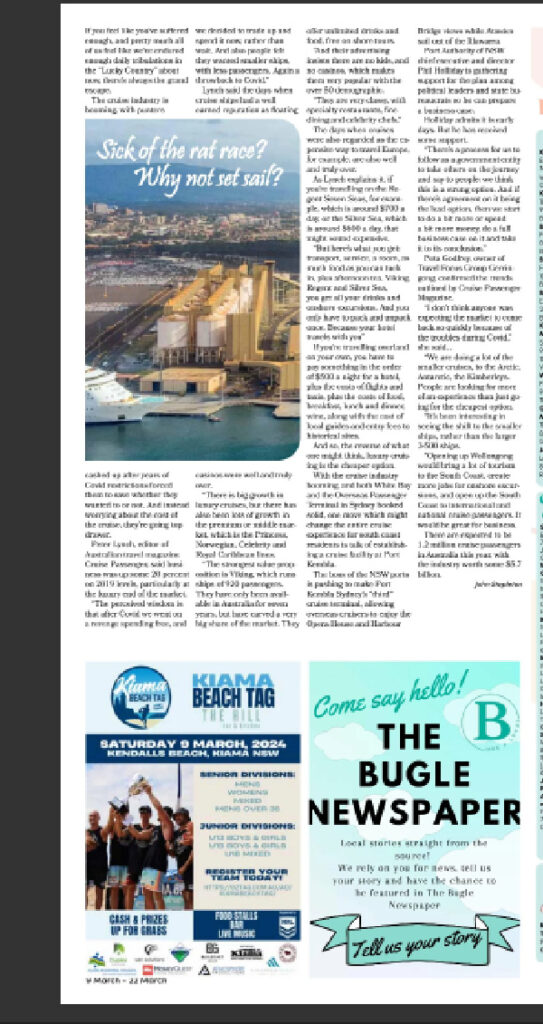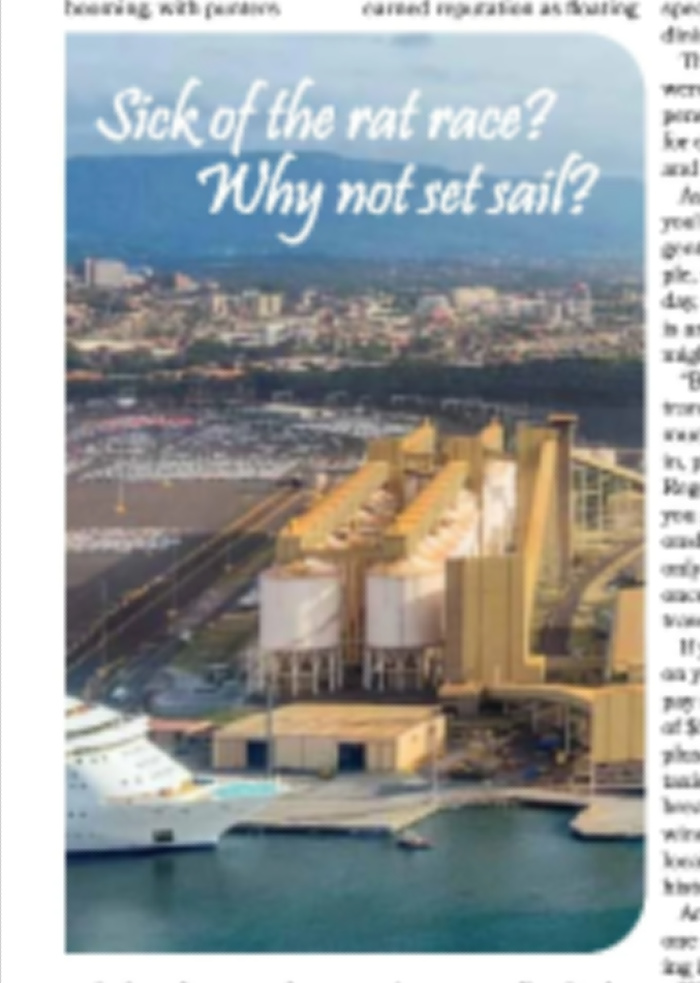Kiama Bugle, 8 March, 2024.
Original copy:
By John Stapleton
Well, if you feel like you’ve suffered enough, and pretty much all of us feel like we’ve endured enough daily tribulations in the “Lucky Country” about now, there’s always the grand escape.
The cruise industry is booming. Punters are cashed up after the years of Covid restrictions forced them to save, whether they wanted to or not. And instead worrying about the cost of the cruise, they’re going top drawer.
Peter Lynch, editor of leading Australian travel magazine Cruise Passenger, recently renamed Cruise&Travel, said business was up some 20 percent on 2019 levels, particularly at the luxury end of the market.
“The perceived wisdom is that after Covid we went on a revenge spending free, and we decided to trade up and spend it now, rather than wait. And also people felt they wanted smaller ships, with less passengers. Again a throwback to Covid.”
Mr Lynch said the days when cruise ships had a well earned reputation as floating casinos were well and truly over.
“There is big growth in luxury cruises, but there has also been lots of growth in the premium or middle market, which is the Princess, Norwegian, Celebrity and Royal Caribbean lines.
“The strongest value proposition is Viking, which runs ships of 920 passengers. They have only been available in Australia for seven years, but have carved a very big share of the market. They offer unlimited drinks and food, free on shore tours.
“And their advertising insists there are no kids, and no casinos, which makes them very popular with the over 50 demographic.
“They are very classy, with specialty restaurants, fine dining and celebrity chefs.”
The days when cruises were also regarded as the expensive way to travel Europe, for example, are also well and truly over.
As Mr Lynch explains it, if you’re travelling on the Regent Seven Seas, for example, which is around $700 a day, or the Silver Sea, which is around $600 a day, that might sound expensive.
“But here’s what you get: transport, service, a room, as much food as you can tuck in, plus afternoon tea. Viking, Regent and Silver Sea, you get all your drinks with meals and onshore excursions. And you only have to pack and unpack once. Because your hotel travels with you”
If you’re travelling overland on your own, you have to pay something in the order of $500 a night for a hotel, plus the costs of flights and taxis, plus the costs of food, breakfast, lunch and dinner, wine, along with the cost of local guides and entry fees to historical sites.
And so, the reverse of what one might think, luxury cruising is the cheaper option.
With the cruise industry booming, and both White Bay and the Overseas Passenger Terminal in Sydney booked solid, one move which might change the entire cruise experience for south coast residents is talk of establishing a cruise facility at Port Kembla.
The boss of the NSW ports is pushing to make Port Kembla Sydney’s “third” cruise terminal, allowing overseas cruisers to enjoy the Opera House and Harbour Bridge views while Aussies sail out of the Illawarra.
Port Authority of NSW chief executive and director Phil Holliday is gathering support for the plan among political leaders and state bureaucrats so he can prepare a business case.
Holliday admits it is early days. But he has received some support.
“There’s a process for us to follow as a government entity to take others on the journey and say to people: we think this is a strong option. And if there’s agreement on it being the lead option, then we start to do a bit more or spend a bit more money, do a full business case on it and take it to its conclusion.”
Peta Godfrey, owner of Travel Focus Group Gerringong, confirmed the trends outlined by Cruise Passenger Magazine.
“I don’t think anyone was expecting the market to come back so quickly because of the troubles during Covid,” she said. “We are doing a lot of the smaller cruises, to the Arctic, Antarctic, the Kimberleys. People are looking for more of an experience than just going for the cheapest option.
“It’s been interesting in seeing the shift to the smaller ships, rather than the larger 3-500 ships.
“Opening up a terminal in Wollongong would bring a lot of tourism to the South Coast, create more jobs for onshore excursions, and open up the region to international and national cruise passengers. It would be great for business.”
There are expected to be 1.2 million cruise passengers in Australia this year, with the industry worth some $5.7 billion.

